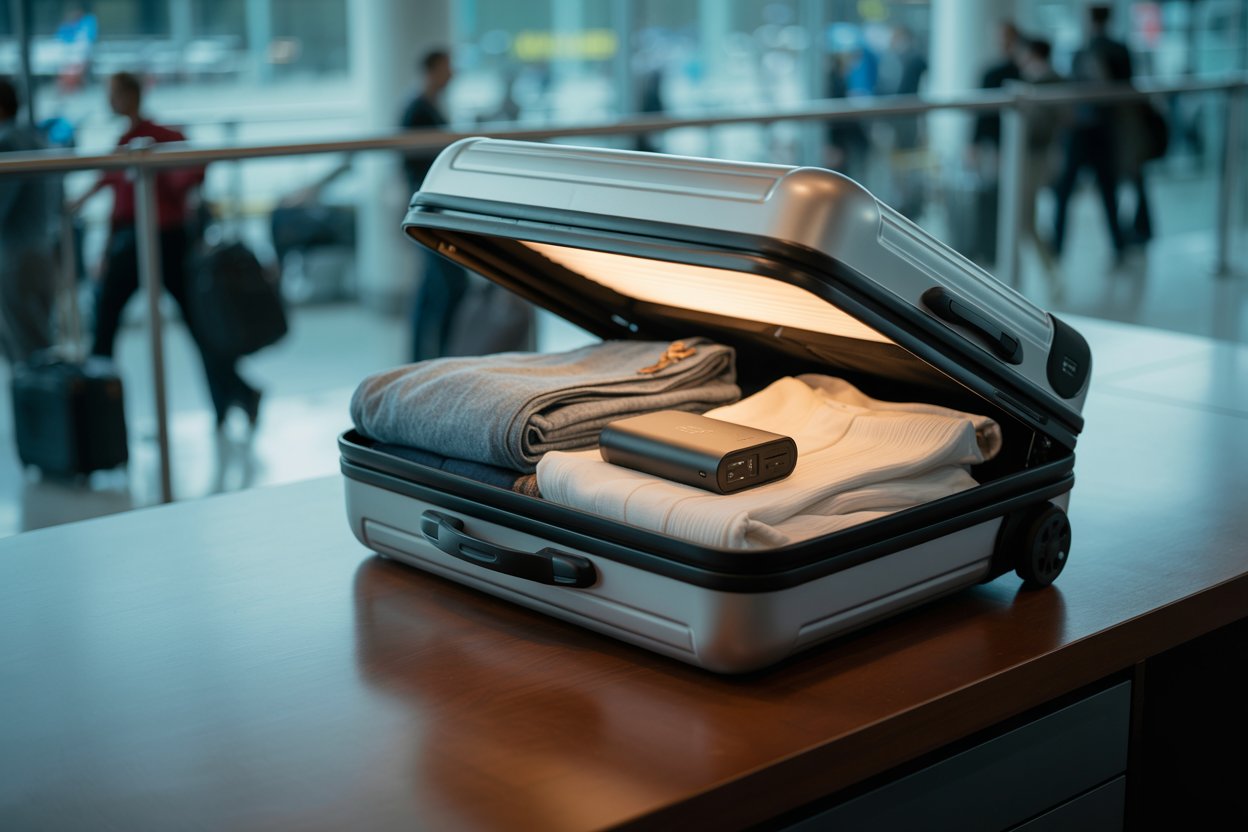[gtranslate]
Published on September 11, 2025
By: Tuhin Sarkar
Airlines are imposing stricter regulations on the use of power banks and portable chargers during flights, a significant concern for many business travellers who rely on these devices for work and connectivity. In response, Flight Centre Travel Group, alongside its flagship brands FCM Travel and Corporate Traveler, has released a comprehensive guide to help travellers adapt to these changes. With safety at the forefront, the guide offers practical tips and alternative strategies for staying charged while flying, ensuring that business trips remain productive despite these new policies.
New Airline Policies on Power Banks and Portable Chargers
In recent months, major airlines worldwide have implemented stricter guidelines regarding the use of power banks and portable chargers on flights. These devices, which have become essential for business travellers, are now subject to growing scrutiny due to safety concerns, particularly the risk posed by overheating lithium-ion batteries. Southwest Airlines led the charge in May 2025, introducing a policy requiring passengers to keep power banks visible during use. This was followed by similar actions from European and international carriers such as Lufthansa, Singapore Airlines, Thai Airways, and China Airlines. In South Korea, a nationwide ban now exists, prohibiting power banks from being stored in overhead bins.
These new regulations are in response to the heightened awareness of battery-related risks in flight safety. The concern stems from instances where overheated lithium-ion batteries have caused in-flight fires, prompting airlines to adopt more stringent policies to safeguard both passengers and crew. While safety is a priority, these changes have left many travellers wondering how to stay connected and powered throughout their flights.
Why Power Bank Restrictions Are Increasing
The rapid growth of portable charging devices has seen power banks become a staple for travellers. From powering smartphones to tablets and laptops, these devices are crucial for maintaining productivity during long-haul flights. However, their lithium-ion batteries pose serious risks if not managed correctly. A malfunctioning or overheated battery could lead to catastrophic consequences. As a result, regulatory bodies and airlines have tightened safety measures to mitigate these dangers.
Advertisement
Advertisement
Airlines are now enforcing these restrictions to prevent incidents during flight. Power banks, which were previously stored in passengers’ carry-on bags or even checked luggage, are now more closely monitored. The move to restrict their use and storage methods highlights the growing concern over battery safety in the airline industry.
Global Airline Responses and New Guidelines
While U.S. carriers like Southwest have led the way with visible power bank policies, European airlines are catching up quickly. Lufthansa, in particular, became the first major European carrier to restrict in-flight power bank usage. This shift reflects a global consensus among airlines to combat the potential hazards posed by these devices. Airlines such as Singapore Airlines, Thai Airways, and China Airlines are also adopting similar measures.
Advertisement
Advertisement
In addition, South Korea’s national policy has set a strict precedent by enforcing a ban on all portable charging devices during flights, alongside a prohibition on storing power banks in overhead compartments. This sets the tone for further international adaptations, as more nations follow suit to enhance aviation safety globally.
Emirates to Enforce Power Bank Ban Starting in October
One of the most significant changes comes from Emirates, the Middle East’s largest airline, which is set to ban the use of power banks during flights starting in October 2025. Under the new policy, passengers will be required to store their power banks in the seat pocket or under the seat in front of them, provided the devices are turned off. This change further emphasizes the critical need for airlines to enforce policies that prioritise safety without disrupting the convenience passengers are accustomed to.
Despite the restrictions, Emirates and other airlines are working towards offering alternative solutions to help passengers stay powered up during flights. While these changes will undoubtedly impact many, airlines are committed to ensuring that passengers continue to have options for staying connected while prioritising safety.
Flight Centre’s New Guide to Navigate Power Bank Restrictions
In response to these growing concerns and changes, Flight Centre Travel Group has released an essential safety guide designed to help travellers navigate the new power bank restrictions. The guide provides actionable advice for staying charged while flying, offering tips such as boarding with fully charged devices, packing USB-compatible charging cords, and using in-flight entertainment systems to conserve device battery.
Charlene Leiss, President of Flight Centre Travel Group Americas, highlighted the importance of remaining informed about these policy changes. She emphasized that safety should always be a top priority, but there are strategies available that can help business travellers stay connected and continue working in-flight. The guide encourages travellers to plan ahead, check airline policies before flying, and make use of available charging facilities at airports and in-flight.
Top Tips to Stay Powered During Flights
- Understand the Policy: Always check your airline’s specific power bank policy before travel. Rules can vary and are subject to change.
- Board Fully Charged: Ensure your devices are fully charged before boarding, and make use of charging stations available in lounges or restaurants.
- Pack a Charging Cord: Many airlines offer USB charging ports on long-haul flights, so make sure to bring a compatible USB charging cord.
- Use Tablets Instead of Laptops: Tablets are often easier to charge through USB ports, making them a better option for in-flight work or entertainment.
- Avoid Public USB Ports: To protect your data from potential cyber threats, avoid public USB ports, especially in airports. Instead, use a wall outlet with your own charger or a portable power bank.
These tips can help mitigate the inconvenience of power bank restrictions, ensuring that business travellers can maintain their productivity while on the move.
Why It’s Crucial for Business Travellers to Adapt
For business travellers, these new restrictions may seem like a hindrance, but they are essential for ensuring the safety of everyone on board. As airlines continue to implement stricter safety measures, understanding the new rules and adapting accordingly will be critical. The new guide from Flight Centre Travel Group offers a practical solution to help travellers stay connected and productive during their flights.
Travellers should also consider upgrading their technology to meet these new demands, such as investing in smaller, certified power banks that comply with airline regulations. Ensuring that all devices are compliant with airline policies will streamline the travel experience and reduce any potential disruptions.
Flight Centre Travel Group’s release of this essential guide is a timely resource for business travellers navigating the growing number of in-flight power bank restrictions. These changes, while focused on safety, present new challenges for those who rely on their devices to stay connected while travelling. By following the advice outlined in the guide, travellers can continue to be productive in the air, ensuring that their journeys remain efficient and smooth despite the evolving airline polici
Advertisement
Tags: airline power bank policy, business travel tips, Flight Centre Travel Group, portable chargers, travel safety guide
Advertisement
Tags: airline power bank policy, business travel tips, Flight Centre Travel Group, portable chargers, travel safety guide
I want to receive travel news and trade event update from Travel And Tour World. I have read Travel And Tour World’sPrivacy Notice.
Friday, September 12, 2025
Friday, September 12, 2025
Friday, September 12, 2025
Friday, September 12, 2025
Friday, September 12, 2025
Friday, September 12, 2025
Friday, September 12, 2025
Friday, September 12, 2025




